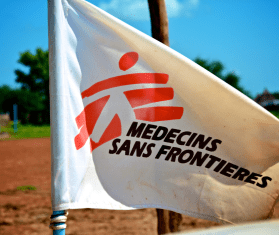Emergency Relief Operation Launched
Luanda/New York, May 3, 2002 — The international medical relief organization Doctors Without Borders/Médecins Sans Frontières (MSF) is starting an emergency feeding and medical program in Chipindo, in the province of Huila in Angola to come to the rescue of 18,000 people, who had been isolated there with inadequate food supplies. On the morning of May 2, a ten-person medical and logistical team left MSF's mission at Caala with two trucks full of fortified food and medical emergency equipment. The first delivery will be distributed immediately to children under 10. A therapeutic feeding center and health center will also be opened to treat the most severely malnourished and ill—in particular the children.
The situation in Chipindo is dramatic. During its exploratory medical mission the MSF team discovered mortality figures as high as 6.1/10,000/day for children under 5 and 4.5/10,000/day for the population in general. These figures are well above the emergency threshold of 1/10,000/day.
"We have seen hardly any little children under 5. Lots of them have already died," says Mercedes Tataï, MSF's medical emergency coordinator. "A whole hill has been covered with fresh graves since September."
A rapid nutritional evaluation of children shows 57% global malnutrition and 35% severely malnourished. The MSF team also came across significant numbers of malnourished adults and adolescents. A dozen children in immediate need of care have been taken to the MSF hospital in Caala.
The 18,000 civilians were moved from their homes to Chipindo between September and March by Angolan government forces. They have had no access since to their farmland or to humanitarian and food aid. After surviving three years of war, violence, looting, and isolation, these people are now in immediate danger of dying.
Chipindo is the fourth of these emergency situations that MSF has come across since it was able to start exploring parts of the provinces of Huambo, Huila, and Bie, which were inaccessible until the cease-fire at the beginning of last month. In the other provinces where MSF is working, the teams are seeing similar phenomena. Without an immediate relief effort by the authorities and the international humanitarian agencies, MSF fears that the disaster, which has already killed thousands of people, will claim tens of thousand more.
MSF has been working in Angola since 1983 and has about 100 international and more than 1,000 national staff working in 11 of the 18 provinces of the country.



